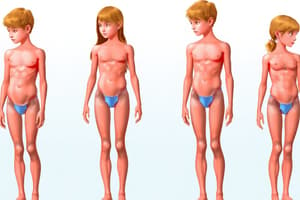Podcast
Questions and Answers
Match the following developmental processes with their descriptions:
Match the following developmental processes with their descriptions:
Biological processes = Changes in an individual’s physical nature. Cognitive processes = Changes in an individual’s thought, intelligence, and language. Socioemotional processes = Changes in an individual’s relationships with other people, emotions, and personality. Social policy = A national government’s course of action designed to promote the welfare of its citizens.
Match the following influences with their definitions:
Match the following influences with their definitions:
Normative age-graded influences = Biological and environmental influences that are similar for individuals in a particular age group. Normative history-graded influences = Biological and environmental influences that are associated with history. These influences are common to people of a particular generation. Nonnormative life events = Unusual occurrences that have a major impact on a person’s life. The occurrence, pattern, and sequence of these events are not applicable to many individuals. Lifespan perspective = The perspective that development is lifelong and constructed through biological, sociocultural, and individual factors working together.
Match the following questions with their meanings:
Match the following questions with their meanings:
Nature versus nurture question = The question about how nature (genes) and nurture (environment) interact in development. Stability-change issue = The debate about the degree to which early traits and characteristics persist through life or change. This = this
Match the following theories with their descriptions:
Match the following theories with their descriptions:
Match the following terms with their descriptions:
Match the following terms with their descriptions:
Match the following genetic terms with their descriptions:
Match the following genetic terms with their descriptions:
Match the following definition-related terms with their descriptions:
Match the following definition-related terms with their descriptions:
Flashcards are hidden until you start studying
Study Notes
Developmental Processes
- Processes involve physical, cognitive, and emotional changes through life.
- Key theorists contribute to understanding through model frameworks.
- Major stages include infancy, childhood, adolescence, adulthood, and old age.
Influences on Development
- Environmental influences refer to external factors impacting growth.
- Genetic influences involve inherited traits affecting development.
- Cultural influences encompass societal norms and values shaping behavior and perspectives.
Questions Related to Development
- Open-ended questions allow exploration of thoughts and opinions.
- Closed questions seek specific information often yielding yes or no answers.
- Probing questions encourage deeper analysis of a response.
Theories of Development
- Psychosocial theory emphasizes the influence of social relationships on development.
- Cognitive development theory focuses on intellectual growth stages.
- Attachment theory examines emotional bonds and their impact on relationships.
Terms and Definitions
- Nature refers to genetic inheritance and biological factors.
- Nurture pertains to environmental influences and upbringing.
- Developmental milestones are key skills achieved typically during certain ages.
Genetic Terms
- Genotype denotes the genetic constitution of an individual.
- Phenotype refers to observable traits resulting from the genotype and environment.
- Alleles are different forms of a gene that determine specific traits.
Definition-Related Terms
- Synonyms are words with similar meanings.
- Antonyms are words with opposite meanings.
- Homonyms are words that sound the same but have different meanings.
Studying That Suits You
Use AI to generate personalized quizzes and flashcards to suit your learning preferences.




